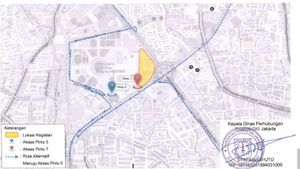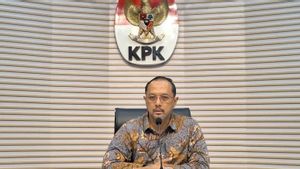JAKARTA - Political dynasties are common in world politics. Starting from the United States, Canada, India, Pakistan, the Philippines, to Indonesia, everything is there. Political dynasties can be understood as the perpetuation of power that is passed down from generation to generation in one family, either because of ties of blood or marriage.
Usually, political dynasties are found in a government system in the form of a monarchy. Since the fourth century AD, political dynasties have become known in non-monarchical governments, namely in the Republic of Venice, which is now part of Italy.
In Indonesia, the issue of political dynasties has become increasingly prominent since the Reformation Movement was launched in 1998. One of the consequences of the reforms is a significant change in the local government system. The change is in the form of direct Regional Head Elections (Pilkada). In the New Order era, regional heads were determined by the central government.

One of the fruits of reform was the Law No. 22 of 1999 concerning Regional Government. This law has been amended several times, but still with the same goal, namely a decentralized system that emphasizes local democratic models.
The implementation of the decentralization policy is direct Pilkada. In theory, decentralization provides many positive values, among others, officials are considered to be more sensitive to problems in the regions; cut the complexity of bureaucratic flows from the center; innovation of local government administration which is expected to be more flexible and creative; and much more.
“Decentralized democracy is a more effective way of meeting local needs than central government designs,” writes Brian Clive Smith, Professor Emeritus of Political Science at the University of Dundee, Scotland in the book Decentralisation: The Territorial Dimension of The State.
Contradictory PracticesThe practice of decentralization and direct Pilkada is contrary to theory, which has noble aims. In theory, direct local elections function to bring sovereignty closer to the people, a more tangible manifestation of democracy, and transparent accountability.
In practice, these direct elections often give birth to political dynasties. The desired goal is only one, perpetuating power in the hands of the same party. Political dynasties also cause the election contestation to be unfair.
Candidates for regional heads who come from political dynasties have more advantages over their competitors. Both in the form of superiority in resources, popularity, and networks, all of which are empowered to lead people to choose a candidate from a political dynasty.
As the theory of Sir John Dalberg-Acton, who is famous for the statement: "power tends to corrupt, and absolute power must corrupt". Such is the case with political dynasties. The need for enormous resources to perpetuate power has caused regional leaders who come from political dynasties to do everything possible, including corruption.

The combination of the need for enormous resources, malicious and deceitful intentions, and a corrupt mentality have triggered a spike in corruption in the regions. The current case, of course, happened to the Regent of Bogor, Ade Yasin.
Ade was arrested by the Corruption Eradication Commission (KPK) at his official residence in Cibinong, Bogor Regency on April 27. He was accused of bribing officials from the Supreme Audit Agency (BPK) in order to obtain Unqualified (WTP) status in the Bogor Regency Government's financial statements, which were actually problematic.
Ade is the younger brother of the former Bogor Regent in 2008-2013 and 2013-2014, Rachmat Yasin who is also involved in corruption.
Fourth Case Throughout 2022Ade Yasin's involvement in the Bogor Regency Government corruption case made him the fourth regional head to be appointed by the KPK throughout 2022. In the first three weeks of January, three regional heads experienced the same thing as Ade.
The three regional heads who were caught in the KPK's Hand Catching Operation (OTT) before Ade were the Mayor of Bekasi, Rachmat Effendi; Regent of Penajam Paser Utara, East Kalimantan, Abdul Gafur Mas'ud; and the Regent of Langkat, North Sumatra, Issued a Wind-War Plan.
Rachmat was arrested on January 6 on charges of accepting bribes from land compensation for a number of Bekasi City Government (Pemkot) projects. The man who is familiarly called Pepen is also accused of accepting bribes from several Bekasi City Government employees, as compensation for the positions they have received. In Rachmat's case, the KPK confiscated evidence of cash worth Rp. 5.7 billion.

Abdul Gafur was arrested in Jakarta on 12 January. He was charged with accepting bribes related to the procurement of goods and services, as well as the licensing of several projects in North Penajam Paser Regency. The evidence obtained was in the form of cash worth Rp. 1 billion and a bank account of Rp. 447 million.
Terbit was arrested in Langkat on 18 January. He was charged with accepting bribes for the procurement of goods and services project in Langkat Regency. During Terbit's arrest, evidence of cash worth Rp. 786 million was also confiscated.
That is the reality that Indonesia faced after the 1998 Reform Movement. This noble purpose movement in practice gave birth to illegitimate children called political dynasties and corruption.
The English, Chinese, Japanese, Arabic, and French versions are automatically generated by the AI. So there may still be inaccuracies in translating, please always see Indonesian as our main language. (system supported by DigitalSiber.id)













